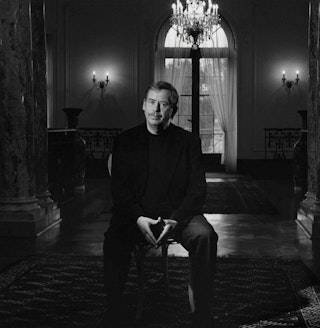
Vaclav Havel
Devoted statesman and dissident. Prominent playwright and essayist. The last president of Czechoslovakia, the first president of the Czech Republic, and one of democracy’s most forthright and principled voices.
Featured lesson
What Does Free Expression Mean?Václav Havel was born in Prague, Czechoslovakia, in 1936 to a wealthy, intellectual family that was active in culture and politics. He completed his required education in 1951, but the Communist government did not allow him to continue to study formally because of his bourgeois background. Instead, he apprenticed as a chemical laboratory assistant, took evening classes, and completed his secondary education in 1954. None of the colleges or universities with humanities programs would accept Havel for political reasons, so he studied at Czech Technical University in Prague, dropping out after two years. He married Olga Šplíchalová in 1964.
Considered Czechoslovakia’s leading playwright, Havel wrote more than 20 plays and many works of nonfiction in his literary career. He was also a perennial victim of state repression under Communist rule, a fact that permeated his writing. He is celebrated for his absurdist plays, including “The Garden Party,” “The Increased Difficulty of Concentration,” “The Memorandum,” “Largo Desolato,” and “Temptation.” Known as a leader of the opposition, he became famous for his work on the human rights manifesto “Charter 77,” and his 1978 work, “The Power of the Powerless,” is often called one of the best political essays ever written. In 1979, in retaliation for his human rights activism, Havel was sentenced to four and a half years of hard labor, during which he wrote “Letters to Olga.”
In late 1989, the Communist rule came to an end during the Velvet Revolution, followed by the reestablishment of a democratic parliamentary republic. Havel became the 10th and last president of Czechoslovakia, and through his leadership, political savvy, and moral persuasion, he negotiated a peaceful transition to democracy. Out of the ashes of Soviet control emerged a new state, based on free expression, political participation, civil society, and commitment to the rule of law. In a total of 13 years as president, he led Czechoslovakia and later the Czech Republic to an open democracy with several political parties. The Czech Republic also joined NATO and started negotiating membership in the European Union, which was realized in 2004. Havel was also one of the first people to sign the 2008 Prague Declaration on European Conscience and Communism—a declaration calling for Europe-wide condemnation of, and education about, the crimes of communism.
During his tenure as president, in his plays and essays, and throughout the surveillance and suppression he endured, Havel came to be seen as the soul of the Czech nation. Among many honors, he was the inaugural recipient of Amnesty International’s Ambassador of Conscience Award for his work in promoting human rights. He was awarded the International Gandhi Peace Prize by the government of India and the U.S. Presidential Medal of Freedom. To the end, Václav Havel was armed with a strong moral compass and the honest voice of a dissident. He died in 2011 at the age of 75.
“I feel that the dormant goodwill in people needs to be stirred. People need to hear that it makes sense to behave decently or to help others, to place common interests above their own, to respect the elementary rules of human coexistence.”
Help Us Protect Human Rights
Please give now. Your contribution will make a difference in the critical effort to achieve equal rights for all.